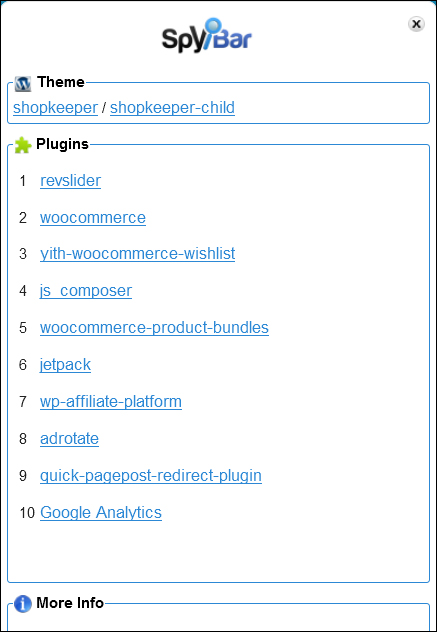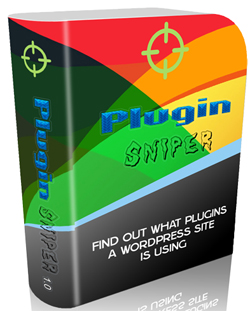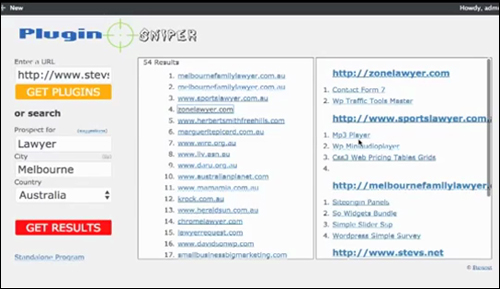 When the “blogging revolution” first began, blogs looked like blogs and websites looked like websites. One could easily tell them apart.
When the “blogging revolution” first began, blogs looked like blogs and websites looked like websites. One could easily tell them apart.
Then WordPress came along and everything changed. Now, it’s getting almost impossible to tell the difference between blogs and websites. Not so much in terms of what the sites are being used for, but in terms of website design and also being able to tell what type of web application is actually powering the site.

(Can You Tell Which Application Websites Are Built With?)
For many website owners, understanding the difference between a CMS application like WordPress and other website-building software is huge, not so much in terms of the technical differences, but more importantly, regarding the things that matter to most website owners, such as web development costs, ease of use, ability to maintain the website up-to-date, managing web content, etc.
Think about this …
Which of the following options would you choose?
A) An eye-catching, professional-looking website that turns out to be quite expensive to build, or
B) The same eye-catching, professional-looking site, but at a much cheaper cost than the cost of getting option “A” above.
If you chose site ”B” above, then you need to learn more about the benefits of using WordPress, why WordPress can provide you with an eye-catching website that could cost far less to build than websites which use other web editor tools … and how to tell these two types apart!
WordPress is the world’s most used online publishing platform and content management system (CMS). It is a powerful and easy-to-use CMS suitable for ”non-techy” website owners.
Whether your reason for having a web site is for personal blogging or business use, WordPress is easy enough for a beginner with no programming skills to use, and offers an array of helpful extensions that make your web presence highly effective in terms of getting your content published, promoting visitor interaction, generating business leads and sales, scalability, etc.
With almost one in every five websites around the world currently being powered by WordPress, chances are that if you already own a website, yours is also a WordPress site.
And if you don’t have a website yet, or are considering getting one built, then wouldn’t it be great to show your web developer an existing site with the design and layout that you like, know that it was built with WordPress and that you can, therefore, get something similarly built for your business for very little cost?
Is My Web Site WordPress?
Do you need to know if your website is powered by WordPress? Maybe you’ve come here because you’ve heard or read about all of the great advantages of using WordPress, and you’re now wondering if your site was built using the WordPress software, or some other CMS application.
Also, have you ever looked at a competitor’s website and wondered what they’re doing to try and get better results online?
Knowing if your competitor’s site is built with WordPress can tell you a few things about their strategies and methods, such as what themes or plugins they are using.
Here are a number of ways to tell if a site is powered by WordPress:
Check The Page’s Source Code For The TellTale WordPress Footprint
If you know how to access the source code of a web page (e.g. Firefox Menu > Web Developer > Page Source if using Firefox, or Google Menu > More Tools > View Source if using Google Chrome), you can look for a tell-tale footprint that the site was built using WordPress …
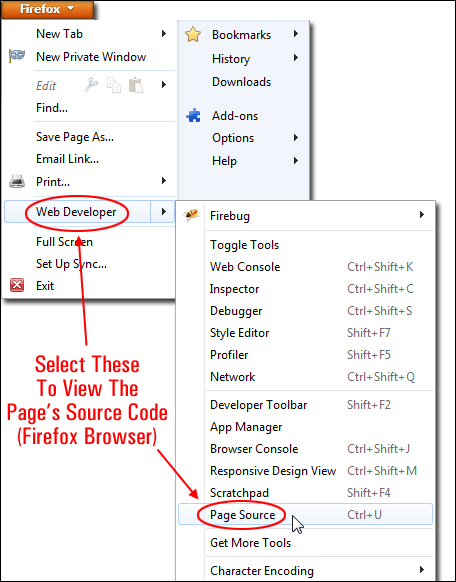
(View your page source code in Firefox)
Let’s say that you are surfing the web and you visit a website that you like, and you would like to know if the site is built on WordPress …

First, bring up the site’s source code on your screen, using the methods described above.
In the page’s source code, search for “wp-content” either by scanning the code …
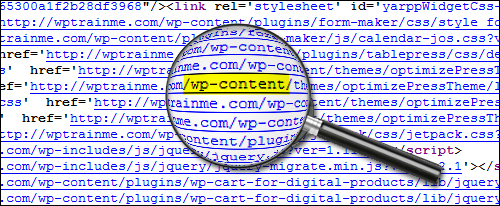
Or use your browser’s “Find” function …
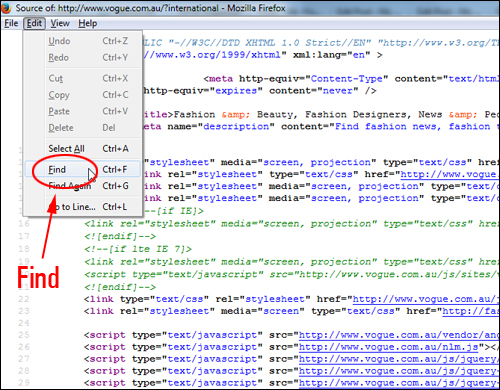
(Using Firefox’s ‘Find’ function)
This will quickly tell you if the site is powered by WordPress or not.
Note: If you do not find “wp-content” within the source code, it doesn’t mean that the website is not a WordPress site.

There are other ways to tell if a site was built using the WordPress software, as we will soon be discussing.
As the point of this post is to try and help non “techies”, however, below you will find a number of easier methods you can use to check if your web site is built using WordPress other than scanning the source code.
Ask Your Webmaster
While this may seem like the most obvious thing to do, a number of web developers, for whatever reason, will build clients a website and not tell them it’s been built with WordPress.
If you have an existing website and you can’t tell what CMS application is driving it, just ask your webmaster or whoever built your web site if it runs on WordPress.
That was easy, huh?
Okay … what if you can’t get in touch with your website developer, or what if you’ve come across a website that you really like while browsing online and you want to know if the site was built with WordPress?
Powered By WordPress
If the site uses a WP theme where the web templates have not been edited, you can typically see a “Powered by WordPress” notice showing at the bottom of the site …

(Powered by WordPress)
If these simple methods haven’t helped you, here are some other ways of telling whether a site was built using WordPress or not …
Online Tools That Tell You If A Website Is Built With WordPress
Here are a couple of tools that can tell you if your website uses WordPress or not, and what themes or plugins the site uses …
Is It WordPress?

(Is It WP)
Is It WP? is a free tool that can tell you very quickly if a website runs on WordPress or not.
Using this tool is very simple. Just type in or paste in the URL of the site into the URL field and click the button next to it.
The tool will then go through the URL pages and tell you if the site was built using WordPress, and if so, which version of WordPress it is currently using …

If the web site does not run on WordPress, you will get a message like the one shown in the screen shot below …
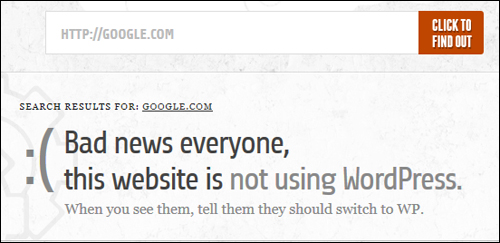
To visit this site, go here:
Advanced WP Theme Checker by Satori
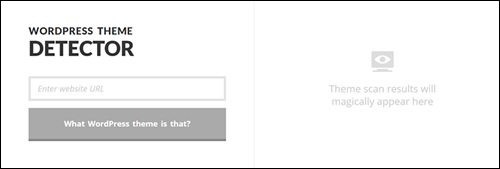
(WordPress Theme Detector)
WordPress Theme Detector by Satori Studio is a free tool that can help determine whether or not a website uses WordPress as its CMS engine; it will also tell you which theme the site is using and provide a link to the theme’s official page.
To use this tool, paste the URL of a web page (it doesn’t have to be the home page) into the ‘Enter website URL’ field and click on the ‘What WordPress theme is that?’ button …
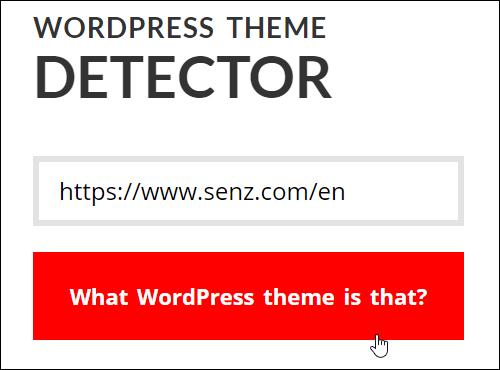
(Enter website URL and click the button)
The Detector will automatically scan the website and output its theme information …
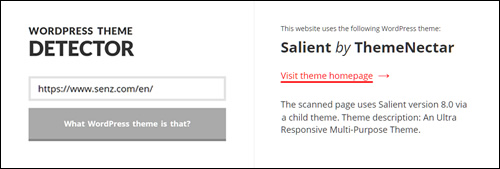
(WordPress Theme Detector displays theme results)
If a website is built with WordPress but the theme is too customized to contain any traces of its origins, the Detector will still let you know it’s a WP site by outputting a message on the right.
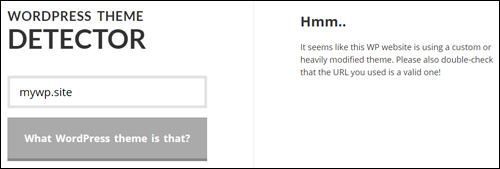
(Modified WordPress theme message)
If the website is not using WordPress at all, the tool will also let you know …
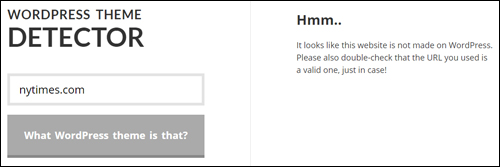
(This website is not WordPress)
You can try the Detector yourself by visiting this link:
Wappalyzer – Add-On For Firefox & Chrome Browser

(Wappalyzer – Web Browser Add-On (Firefox / Chrome))
If you browse the net using either Firefox or Google Chrome and want to be able to see if the sites that you are visiting are WP-driven, then Wappalyzer is a very useful add-on for your web browser.
Wappalyzer tells you what type of software is installed in the sites you are visiting.
According to their website …
“Wappalyzer is a browser extension that uncovers the technologies used on websites. It detects content management systems, eCommerce platforms, web servers, JavaScript frameworks, analytics tools and many more.”
Wappalyzer is also an easy to install and easy to use browser extension.
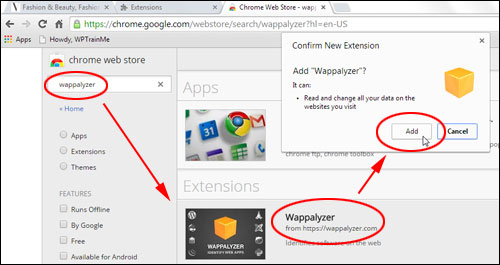
Once you have installed the Wappalyzer add-on on your web browser, icons will appear in your browser menu identifying which technologies are installed on the sites you visit …
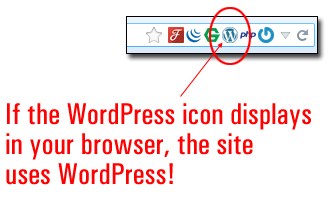
If you see the WordPress icon on the browser menu (as the above screen shot shows), then the site has been built with WordPress.
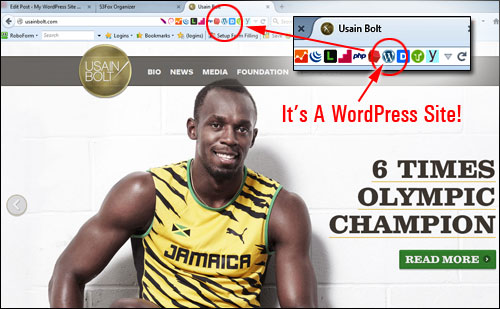
(A WordPress site!)
Go here to learn more:
SpyBar
(SpyBar – Browser Addon For WordPress)
SpyBar is a browser addon that lets you ‘reverse engineer’ any WordPress site you visit and see which WordPress plugins and themes are being used, right inside your web browser …
(SpyBar – Discover WordPress Plugins And Themes Used By Your Competitors)
SpyBar can be installed as a browser extension on Google Chrome and Mozilla Firefox and is compatible with PC and Mac.
To download or learn more about SpyBar, visit the site below:
Plugin Sniper
(Plugin Sniper – Find out what plugins a WordPress site is using)
Plugin Sniper lets you find out what plugins a WordPress site is using. This is a useful tool if you want to know what WordPress plugins are being used by your competitors.
Plugin Sniper is also a useful tool for researching what kinds of plugins businesses in certain niches are using …
(Search WordPress sites by categories and location)
To download or learn more about Plugin Sniper, visit the site below:
I hope that you have found the above the information in this tutorial useful.
***
"This is AMAZING! I had learnt about how to use WordPress previously, but this covers absolutely everything and more!! Incredible value! Thank you!" - Monique, Warrior Forum

